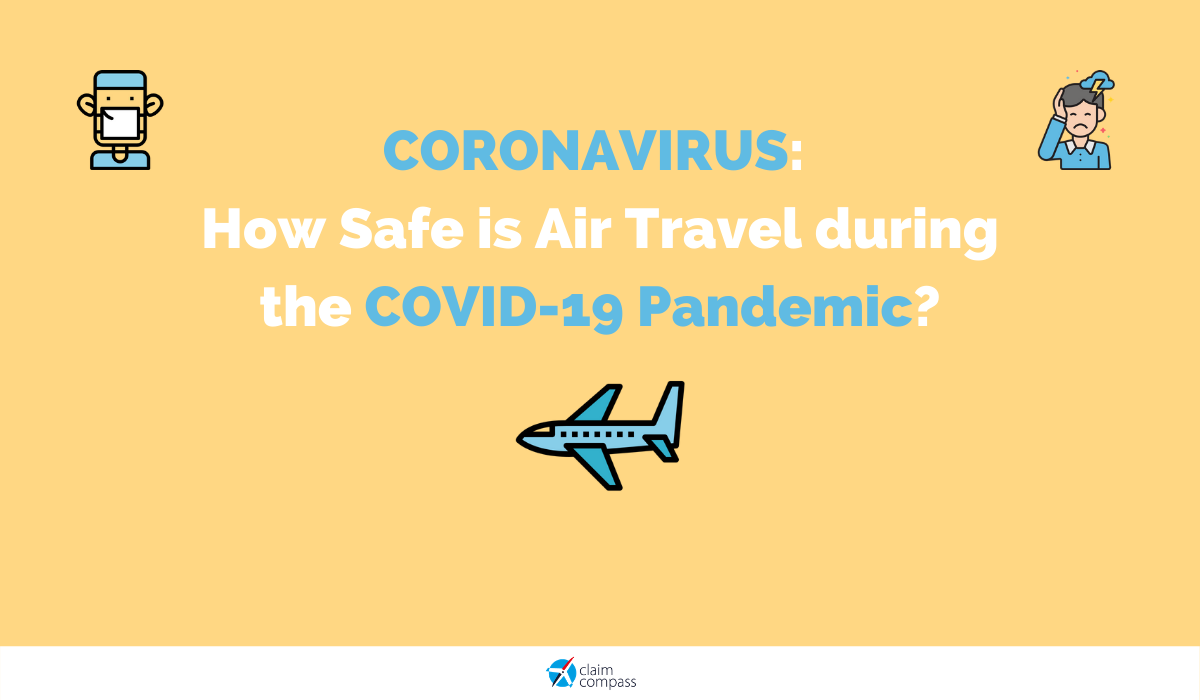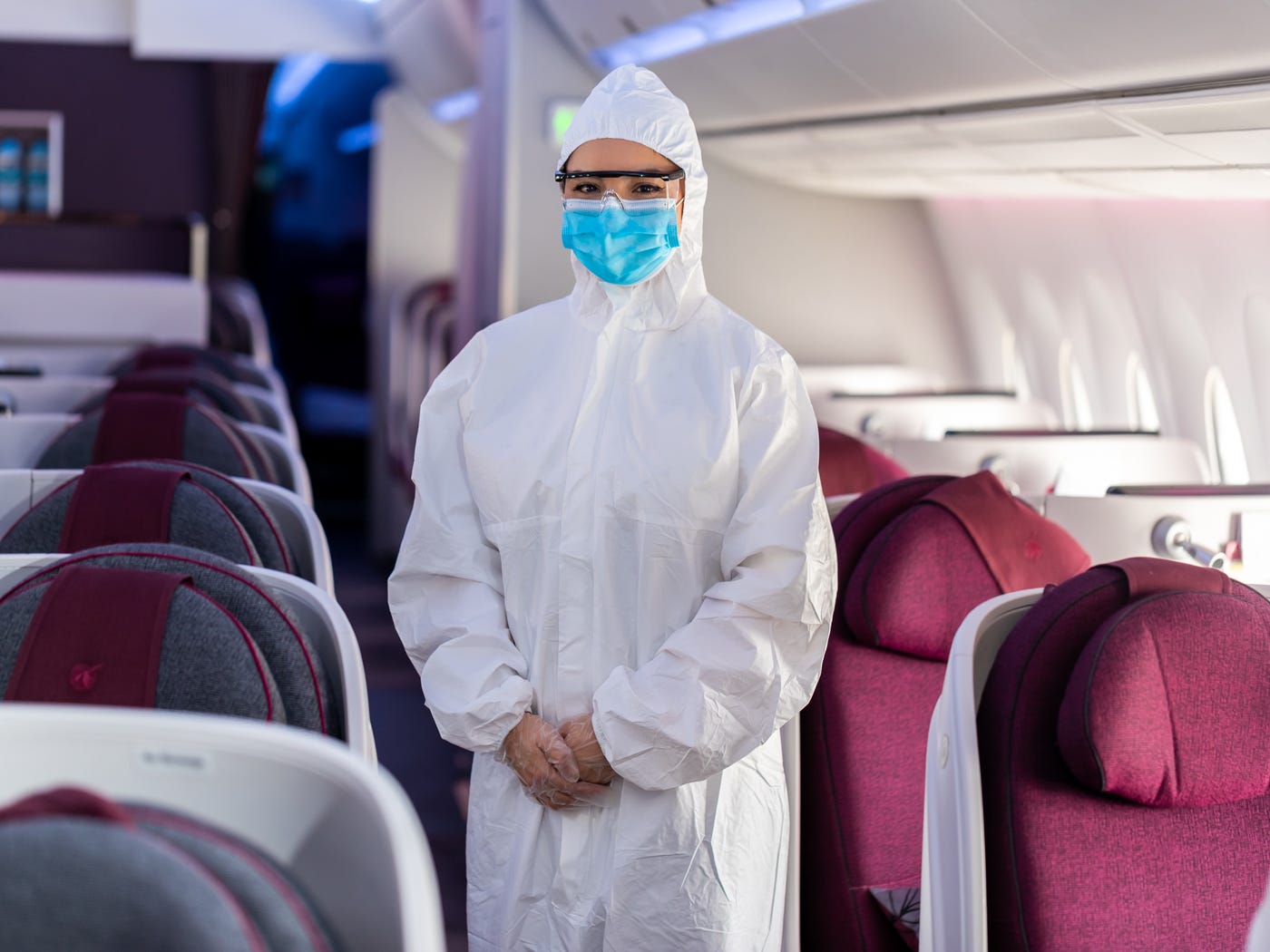Is Air Travel Safe During the COVID-19 Pandemic?
You want to travel despite the COVID-19 outbreak but you're not sure whether air travel is safe at the moment or not? Here's what you should know.

Although health authorities strongly recommend to suspend all non-essential travel (especially if you already have a pre-existing respiratory illness), it is possible to travel despite the COVID-19 pandemic.
But is it safe to travel by plane during the coronavirus outbreak?
It is much harder to ensure passenger safety with air travel than it is for, say, travel by car or RV. International air travel in particular exposes travelers to more risks, considering that passengers from many countries transit through airports and travel by plane.
That being said, the majority of national and local authorities worldwide have implemented coronavirus travel restrictions to try and curb the amount of affected people. Some airlines have also taken measures of their own - but there are things you can do yourself to make it safer to travel by plane.
(We've also made suggestions on how to make air travel safer during the COVID-19 pandemic, at the bottom of this post)
If you booked a flight ticket but the airline cancelled your trip, you could get a refund. ClaimCompass handles your refund claim!
Measures taken by airlines to improve safety of air travel
Air filtration systems on airplanes
If you think that being locked up in a confined space with a bunch of strangers inevitably means that infections spread to all passengers, think again.
Even prior to the COVID-19 pandemic, aircrafts were equipped with filtration systems that guarantee the air you breath on the plane is very clean.
According to Jean-Brice Dumont, Airbus' chief engineer, cabin air is renewed every 2 or 3 minutes. Air collected from outside the plane is mixed with recycled cabin air, and then passed through HEPA (high-efficiency particulate air) filters. Hospitals use a similar system.
Those HEPA filters are built in a way that allows them to capture particles even smaller than those of COVID-19: the virus' size is about 125 nanometres in diameter and those filters capture particles of 10 nanometres and above.
So, supposedly, air filtration won't be a problem when travel by plane during COVID times.
Flight attendants are better-equipped
To protect passengers from the coronavirus disease, some airlines (not all...) had the good sense to take measures, starting with providing flight attendants with protective gear - both for their own safety and that of the air passengers.
An example that more airlines should consider following is Qatar Airways, which, as early as in May 2020, provided full-body protective gear to its on-board crew (see picture below).

At the very least, flight crews are now required to wear a facial mask during the flight.
Masks are mandatory - on board and at the airport
Air passengers can only enter the airport and the plane if they wear a mask covering their mouth AND nose. The only time when masks can be temporarily removed are:
- at the customs' desk
- when eating and drinking
Passengers refusing to wear facial protection are subject to boarding denials and/or fines.
Empty middle seat
In the interest of social distancing, some airlines (again, not all) have elected to NOT sell middle-seat tickets. This allows passengers to keep a relatively safe distance between them throughout the flight.
Among airlines that have committed to keeping the middle seat vacant are Delta, JetBlue, and Southwest in the US.
You booked a flight and it got canceled because of coronavirus. Don't let the airline get away with it: you could get a flight cancellation refund!
How to Travel Safely by Plane during the COVID-19 Pandemic?
The Centers for Disease Control and Prevention (CDC) and other health agencies worldwide provide tips to travel safely during COVID times. This travel advice is especially relevant in the context of air travel.
At the airport
1) Maintain social distancing
Some international airports have added stickers on the floor to indicate the safety distance between people waiting at the check-in desk, security control, and customs (for international travel). If those signs aren't there, proactively keep some distance between you and the person in line in front of you.
You may find that while you do try to maintain social distancing, not everyone does. If the next passenger in line after you gets a little too close, ask them gently to please back off.
2) Wear a mask
All airports and major airlines require passengers in transit to wear a mask from the moment they enter the airport, until they exit the terminal at their destination.
If you happen to travel via the only airport where this rule is optional, do yourself a favor and wear a mask nonetheless.
3) Refrain from entering in contact with frequently-touched surfaces
All passengers have to drop off some of their stuff at the security checkpoint. Many people use the ATM machines to withdraw cash. Several travelers hang on to the handrail in the stairs and escalators.
Avoid touching those surfaces with your hands whenever possible. Ideally, you want to wear gloves but at the very least, follow the next point.
4) Wash your hands
Hand washing is hands-down (see what I did there?) THE best way to prevent COVID-19 from spreading. Make sure to pass by the restroom after interacting with airport staff or when you've had to touch something.
As a second-best option, pack a small hand sanitizer bottle with at least 60% alcohol to use as disinfectant.
During your trip
1) Wear face covering
It should be a reflex by now, even when it's not mandatory. Wear facial protection during your whole journey. The only times when flight attendants will let you remove it is when you eat or drink.
2) Avoid contact with other passengers
Easier said than done when you have an attributed seat and no control over whether or not someone is sitting next to you. Nonetheless, if possible, try to get a seat in a row that's not full.
You want to stir away from an infected person - even though someone with COVID-19 shouldn't be able to travel.
Don't jump at every sneeze either! Just because someone is sneezing doesn't mean they have contracted coronavirus - other diseases still exist, remember? It's just basic precaution to avoid close contact with a potentially infected person, whether they have COVID-19 or something more benign.
3) Avoid touching your face
Infectious diseases enter your system primarily through your body's entry points. The eyes, the nose, and the mouth are some of those. It will be hard to keep your hands completely immaculate during the flight, so try to resist the temptation of scratching that itch and wash your hands regularly.
After your trip
1) Test for COVID-19
If you want to be on the safe side, do a test upon arrival at your destination. Keep in mind that unless the test is organized by the local authorities at the airport, you will probably have to pay for it.
2) Lockdown
Among the most common travel restrictions is a mandatory period of self-isolation upon arrival in a new country. Several nations have abandoned this practice in the summer in the interest of not hindering tourism, but you might consider isolating yourself if you haven't tested for the virus after arriving.
How to Improve Air Travel during the Coronavirus Pandemic?
On thing is for certain: COVID-19 is taking its toll on airlines and airports' profits. That's primarily because the measures best adapted to fight it directly impact the airlines' source of revenue.
1) Enforce social distancing on the plane
Social distancing remains one of the most effective way to avoid being contaminated. In that regard, for air travel to feel and be safer in those troubled times, airlines should all stop selling middle-seat tickets and make only aisle and window seats available.
Many European airlines continue filling up their planes as long as there is demand for it, even if that means leaving no seats empty in a row.
This measure is obviously highly controversial, because removing 2 seats from a 6-seat row means amputating airlines of a third of their revenue on ticket sales.
2) Let passengers choose their seat for free
Low-cost airlines especially are notorious for their "random seat allocation". Unless you pay an extra fee, of course!
In times when traveling next to a total stranger is a source of stress and potential risk, wouldn't it seem appropriate to let passengers traveling together sit next to each other?
If letting them pick their seat is not an option, making sure that the random seat allocation isn't as random: whenever possible, passengers on the same booking should be automatically assigned seats near each other.
3) Better equipment for cabin crew
Providing their cabin crew with better protection is in the interest of both their employees and their customers. Airlines who "only" request flight attendants to wear a mask are doing the bear minimum, no more.
More airlines should take inspiration from the best students in that regard. Maybe Qatar Airways' solution for crew members isn't adapted to all airlines' budgets, but a middle ground between this and the simple mask can surely be found.
4) Hand sanitizer easily available
Free hand sanitizers should be available to all passengers on the plane. It could be provided either by crew members or at the entrance of the plane during boarding.
5) Thorough disinfection upon arrival
I took a flight with a low-cost airline recently - there was about 4 minutes between the time when the previous passengers got off the plane and we got on. There is no way that seats, belt buckles, and tray tables were cleaned before we took our seats.
They probably should have been, considering that those are some of the mos frequently touched surfaces on the aircraft.
So should you travel by plane during the COVID-19 pandemic?
As national and international health authorities like the WHO, NHS, and CDC have said, it would be wiser to suspend all non-essential travel for the foreseeable future. If you still want to travel, there are safer alternatives.
That being said, the air travel industry is in need of financial support and measures HAVE been and ARE being taken to improve air passengers' safety.
I have taken 5 flights in Europe myself this summer and gratefully report no signs of COVID-19 so far.
* knocks on wood *
I strongly recommend that you take the maximum amount of precautions when traveling by plane, no matter how annoying it is. Hopefully, this is only temporary and it will soon be over.
Now, if you DID book tickets but the airline canceled your flight because of the virus, what happens? Well, not everything is lost: while you can't get a flight cancellation compensation, you could still get a refund.
ClaimCompass assists air passengers seeking a flight cancellation refund , for free:
